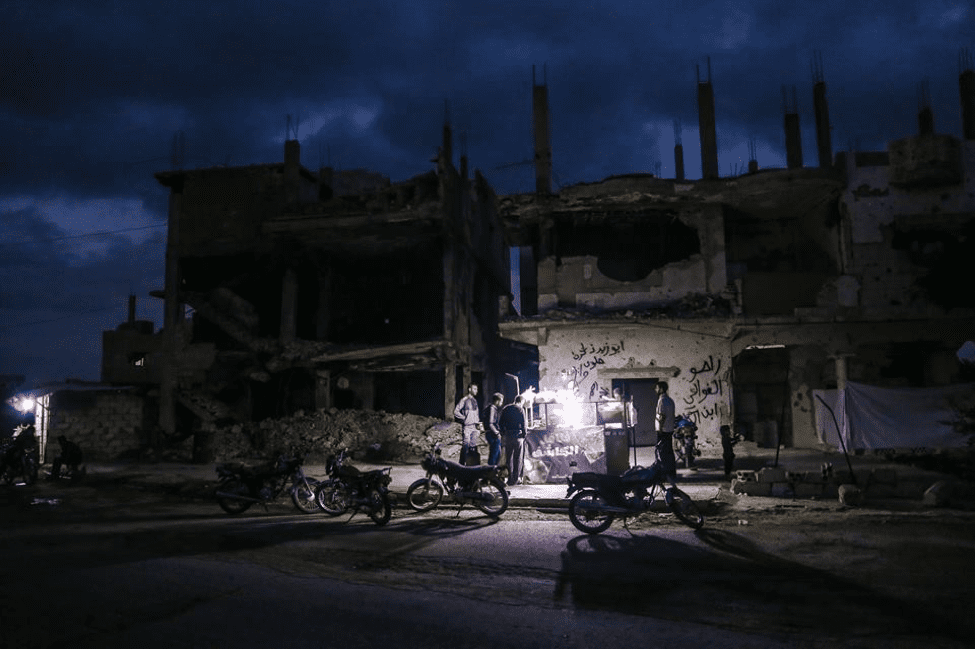Opposition officials have little assistance to offer as Daraa residents return to a provincial capital in ruins
AMMAN: Opposition-held areas of Daraa city are lacking essential infrastructure […]
8 November 2017
AMMAN: Opposition-held areas of Daraa city are lacking essential infrastructure and public services as thousands of displaced residents return to the provincial capital under the Russian-backed ceasefire that continues to hold over southern Syria, local officials and residents told Syria Direct.
The birthplace of the Syrian uprising remains in ruins after a months-long battle between rebel groups and pro-regime forces earlier this year left 85 percent of buildings in rebel-held neighborhoods partially or fully destroyed and completely dismantled the city’s infrastructure, Amin al-Marzouqi, a representative of the Daraa Provincial Council’s statistics office, told Syria Direct on Wednesday.
The battles in Daraa city have since ceased, as a ceasefire agreement covering Syria’s southern provinces—including Daraa, Quneitra and Suwayda—took effect in July following negotiations between Russia, the United States and Jordan.
But winter is approaching and residents are facing “a catastrophe,” said Ayham, a citizen journalist living in the rebel-held Daraa Camp neighborhood.
The city’s electrical lines and water networks remain out of service. Sewage systems are not functioning and rubble still occupies many of the streets.
“The city isn’t ready for life,” Ayham said.
An estimated 5,000 residents have returned to opposition-held areas of Daraa city since the Russian-backed ceasefire took effect in July, said al-Marzouqi of the Provincial Council. They joined about 2,000 residents who had remained in the city, once home to nearly 150,000 people, through the battles.

The returnees are among hundreds of thousands of Syrians who have returned home from internal displacement or refuge abroad this year in the wake of Russian-backed ceasefire agreements, Islamic State defeats and regime-sponsored population exchanges.
Local officials in Daraa told Syria Direct that they can’t keep up with demands from an increasing population.
“The higher the number of returnees to the city, the worse the situation gets,” Mohammad Abdul Majid al-Musalama, president of Daraa city’s local council, told Syria Direct on Wednesday.
The council wants to fix the electrical network and streets as the first priority, but al-Musalama said it doesn’t have the financial resources to do so.
“Restoration of the infrastructure requires huge amounts of money,” he said, noting that the council has reached out to a number of relief organizations for support but received little assistance.
‘A disaster’
“The city is a disaster in every sense of the word,” said Civil Defense volunteer Sara, who returned from Daraa’s eastern countryside to the opposition-held Daraa al-Balad neighborhood last month.
Sara’s family struggles to pay for water—delivered by trucks in the absence of a functioning water network—and her home receives a few hours of electricity each day through regime-held lines that reach her neighborhood.
In addition to the challenges posed by the city’s lack of basic infrastructure, Sara said that residents are facing a bread shortage.
Although the city’s local council distributes bread on a daily basis, Sara told Syria Direct that distributions are inconsistent and that allocations to her neighborhood are not enough.

Ayham, the citizen journalist, said his neighborhood, known as Daraa Camp, has similar issues. Only 200 bags of bread are distributed by the local council each day, he said, not nearly enough for the area’s 380 families.
“Sometimes we get nothing,” he said.
The Syrian National Coalition’s Assistance Coordination Unit (ACU) provides 11 tons of flour to the Daraa city council on a weekly basis, but local council president al-Musalama said residents require at least 21 tons.
“The council has asked for an increase in the amount of flour,” he said. “We are waiting for a reply.”
Syria Direct contacted the ACU for comment, but had not received a response at the time of publication.
‘No heat, no fuel’
As residents struggle to meet day-to-day needs in Daraa city, the fear of violence also persists.
“My neighbors and I are afraid of new battles and becoming homeless once again,” said Mousa, a Daraa al-Balad resident who fled his home in February, as clashes in the city raged.
Mousa says he only spent one week away from home. The cost of living was too expensive, so he returned to Daraa city the same month he left to “live under the bombs.”
The ceasefire is holding and reconstruction is slowly beginning, but Mousa says the conveniences of modern life have not yet returned to the provincial capital.
“The biggest fear is from winter,” he said. “There’s no heat, no fuel.”







